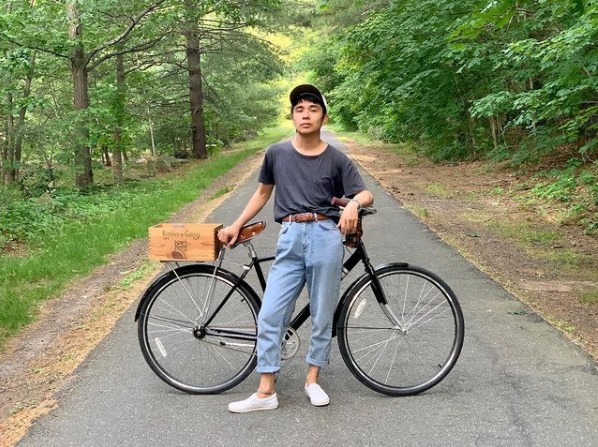Novel by Ocean Vuong discusses his search for identity
4 min read
Ocean Vuong writes about his life experiences in his semi-autobiographical novel. @ocean_vuong / Instagram.com
by MATTHEW SIMMONS
Senior Writer
“In Vietnamese, the word for missing someone and remembering them is the same: nhớ. Sometimes, when you ask me over the phone, Có nhớ mẹ không? I flinch, thinking you meant, Do you remember me? I miss you more than I remember you.”
A couple of weeks ago I saw this quote by Ocean Vuong online. Noticing the number of shares and praise that it was receiving, I decided to give it a shot.
The excerpt was from Ocean Vuong’s debut novel “On Earth, We’re Briefly Gorgeous.” The novel recounts Vuong’s vivid memories, spanning from when he was a young child to young adult. The novel’s release followed the success of his poetry collection titled “Night Sky With Exit Wounds,” which won him the T.S. Eliot prize, along with other notable recognitions. Vuong brought this talent of poetry straight into his first novel, which has received much praise.
In the form of a letter, “On Earth We’re Briefly Gorgeous” is written to the young author’s illiterate mother, who may never have the ability to read what lies within it. It is a story that takes the reader on a journey with Vuong as he recounts the moments that led him to put pen to paper.
Vuong sought asylum alongside his family at the young age of two, eventually immigrating to the United States. He is the child of a Vietnamese woman and an American veteran who fought during the Vietnam War. Vuong’s background would become an important backdrop for the coming-of-age story, where he struggles to find his own identity.
From a young age, Vuong faced the aftermath of what war had done to his family. He initially viewed his abusive mother as a monster, but eventually acknowledged that she and his grandmother alike had become products of a brutal war and had fallen mentally ill as a result. Although still new to the English language, he was given the role of being the family interpreter. Through this, he began carrying an unbearable amount of weight produced by the many sacrifices made by the women before him.
Throughout the book, varying settings held different tones, allowing the reader to capture a whole new set of emotions and understanding within each. In one paragraph, I would be on the shoulder of a street in Vietnam, alongside the narrator, staring up at the napalm-covered skies. Next, I would be underneath the metal roof of a barn where he found his first love—a love that seemingly defined a part of his youth, aiding him in discovering who he was.
I have never before had the opportunity to read a novel that features so many poetic excerpts. Every word had its own place within each sentence of every paragraph, placed carefully, with well-thought-out intentions. Every analogy, connection and memory was brilliantly illustrated, done with research and patience.
I have never taken as many breaks while reading a book before reading this one. I felt as though I had bought a ticket to a ride conducted by Vuong. I was now riding alongside him as he recounted his experiences for the first time through this letter. Every memory presented itself through a sharp turn and growing incline, inevitably dropping after a short wait at the top. I wanted to appreciate each emotional thrill, and I aimed to do so in a proper way.
Although raw in its delivery, this novel is equally as beautiful. I was able to learn about the experiences of first-generation immigrants and the generational sacrifices and work of those before. This was a pressure for Vuong that was laced with the brutal force of drug addiction and acknowledgment of his sexuality, which became present at a young age.
Vuong used the color purple as a way to describe the apathetic moments within his life, to describe days as neither happy nor distraught or just another day that would pass like all the others that came before it. Although complex, this is how the book felt to me. At no point during my time reading did I feel okay with being too happy because I knew that something darker might inevitably follow.
More than anything, this tale perfectly encapsulates what our time on Earth is all about: how we can capture its beauty all while sitting within its inevitable ugliness. Most importantly, it showed how brief these lives are and that, for a moment, death, life and everything in between can be described through words and lived again through decaying memories. This showcases that a change of perspective can enable Vuong and me alike to feel somewhat okay with the harsh realities of the world that surrounds us. By seeing it through a colored lens—a purple one to be exact—we will be okay.


